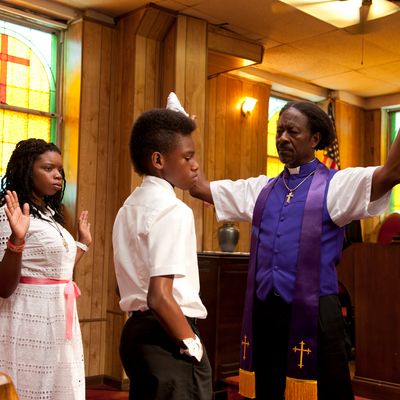
Red Hook Summer is being billed as a return to the personal, low-budget filmmaking that put Spike Lee on the map a few decades ago. And while it’s certainly all that, perhaps the most notable feature of this film — a coming-of-age tale about a young boy’s visit to his grandfather’s Brooklyn neighborhood — is something relatively new to the director’s oeuvre: patience. Red Hook Summer may evoke comparisons to earlier Lee joints like Do the Right Thing, She’s Gotta Have It!, or Crooklyn, but it’s clearly something more contemplative, even austere. And while uneven, it’s also occasionally glorious.
You can sense the reflective nature of the film right at the beginning, as we see young teen Flik (Jules Brown) with his mom (De’Adre Aziza) traveling through the streets of Brooklyn on their way to the apartment of his grandfather, Da Good Bishop Enoch Rouse (whose name will remind some of the tragic figure of Ossie Davis’s Good Reverend Doctor from Jungle Fever), played by Clarke Peters. Flik, a middle-class kid from Atlanta who likes to look at the world through the camera on his iPad, is immediately put off by what he sees: empty playgrounds, gloomy housing projects, urine-soaked elevators. But he’s a boy, and this is his first time here. Mom knows the neighborhood, but Lee lets his camera dwell on her just long enough to catch her unease as well. Why this caring, attentive mother is leaving Flik with his grandfather for the summer in an ostensibly dangerous hood is never spoken; some may see this as a flaw, but I find it impressive that Lee gives us the freedom to wonder.
Much of the film consists of extended exchanges between Flik and his grandfather, and between Flik and Chazz (Toni Lysaith), a pushy but friendly neighborhood girl who starts to fall for him. The boy is passive, but he’s also a wiseass, and there’s a tough, zippy quality to the dialogue. When he first comes into the Bishop’s Jesus-adorned apartment, Flik asks, “No TV set?” “Don’t need one,” the older man replies. “Just the devil’s words to fill an empty mind.” “Where do I sleep with my empty mind?” the boy retorts. (Later, asked what happened to his Christian name, Flik quips, “I rented it out on Facebook.”)
Of course, nobody actually talks like this in real life, and there’s a somewhat artificial quality to much of the film’s dialogue. Nothing really wrong with that, as the performances are all pitched at a proclamatory level — none more so than Peters, playing the preacher trying to teach this young boy about the ways of the world, at least as he sees them. (Peters is amazing here, by the way — alternately gruff, bewildered, assured, charismatic, haranguing, and pathetic. You can’t take your eyes off him, and a savvy distributor could make a good case for an Oscar nomination for this oft-overlooked actor.) Performances in Lee’s films have often broken the fourth wall with their declarative elements — think of the direct address scenes in Do the Right Thing and 25th Hour — but here, coupled with the film’s austerity, it lends the film a certain theatricality. Occasionally, though, there’s a moment of genuine ease: An early, touching iChat conversation between Flik and his mother is one of the most graceful scenes the director has ever shot.
The movie certainly doesn’t take sides between the Bishop and Flik, but there are moments when some in the audience might nod along to Enoch, as when he tries to teach the boy to appreciate his family history, or to enjoy the everyday glory of the things he sees around him — the wheelchair-bound mother who drags herself to work every day, the lady handing religious pamphlets out by the playground, etc. And we sense that the film might be setting Flik up for some kind of “real” experience courtesy of the mean streets of Red Hook.
What comes, though, is thoroughly unexpected. To say more about where Red Hook Summer winds up going in its last act would spoil the movie, even though it’s not exactly plot-driven. One of Lee’s greatest and most overlooked talents as a cinematic engineer has been his ability to manipulate audience identification in unexpected ways. People do terrible things to each other in this movie, but there’s still a brave gentleness to the way it’s shot, an almost nostalgic quality; the film is taking place in the present-day, but we’re clearly seeing it through an older Flik’s eyes, looking back. This is a film made by a wiser man who recognizes that everybody’s looking for salvation in their own way. In the end, as the camera revisits the cast of broken, fallen characters, we may realize that Red Hook, as far as Spike Lee is concerned, is a state of mind.





